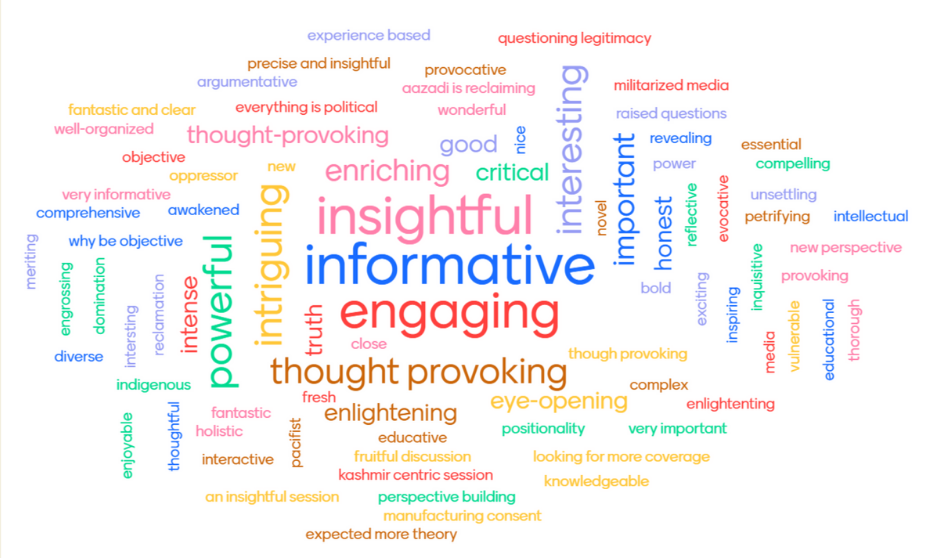SAP Stories 2021
Project Demilitarize
The ALLY project amplifies young people’s constructive voices in addressing diverse factors of violent extremist narratives. No better example of the diversity of these efforts can be found than the Social Action Plan “Project Demilitarization,” created and implemented by 5 fellows from across South Asia.
Huma Nasir, Muda Tariq, Ambica Naithani, Tanha Tanjim, and Pragun Aggarwal are collectively from India, Sri Lanka, Bangladesh, and Sri Lanka. They designed their project during the ALLY regional training in August 2021, and are implementing the ambitious plan with technical and financial support from ALLY.

Word cloud from the online training
Militarism, though intended to provide additional safety and security to citizens in a vulnerable region, can be a double-edged sword that weakens the social fabric and amplifies structural violence. It can particularly affect women and their participation in the economy because it strengthens patriarchy by reinforcing the ‘protector myth’ whereby men in the house and the soldiers in the street work in tandem to remind women that public space is a male prerogative. In doing so, women are not only confined to the four walls of their house but also arms the invisible structures of violence that regard women as the weaker sex, incapable of ensuring personal well-being. Militarization thus serves as an enabler for perpetuating gender stereotypes, fostering violence while placing women under a double burden of having to navigate political conflicts and patriarchy.
Working along the lines of UNSCR 1325, Project Demilitarization investigated why gender is crucial to understanding militarism. The project operated at the intersection of gender and militarization and seeks to look beyond the understanding of women as victims but rather advocate for their active roles in peacebuilding. Through its flagship online courses, which began in December 2021 and will finish in February 2022, the fellows and participants are exploring the gendered facets of militarism by inquiring into gender-based violence, media, tracing women’s agency and resistance, and engendering the psychosocial impact of conflict.
First, the fellows placed an online call for participants in their six-week online training. The training aimed to facilitate conversations and discussions around Gender & Militarism in South Asian communities, with a particular focus on youth coming from conflict zones (or distressed communities). The call for applications went out on December 4. The fellows received an overwhelming number of applications across and beyond South Asia. After rigorous evaluation, they proceeded with 180 participants. The first session was by Professor Cynthia Enloe on Understanding Gender & Militarism.
“The intent is to facilitate conversations for demilitarization, given the gendered and violent nature of militarization, and to build intersectional solidarities. We hope to also locate women as active agents of resistance and conflict transformation, beyond their reduction to mere ‘victims’.”
– Muda Tariq
Building upon the knowledge shared and created from the 6-week-course, Project Demilitarize will work a journey of art, poetry, and critical essays that stem from the learnings of the course. Through art, academia, and activism, they wish to foster the discourse around demilitarization and broaden the PVE framework. Many of these materials can be found on their Instagram page.
Follow the Network’s Asia Programming on social!
